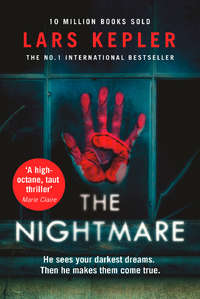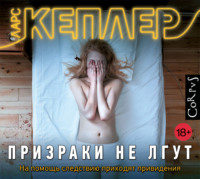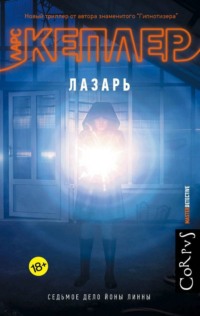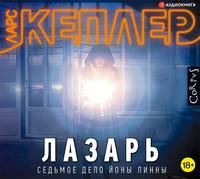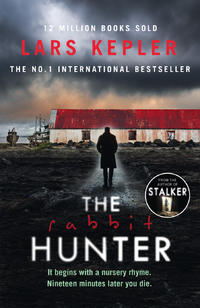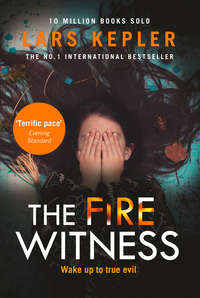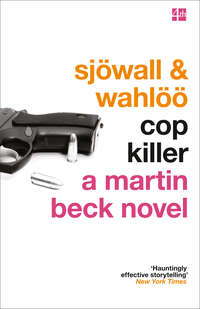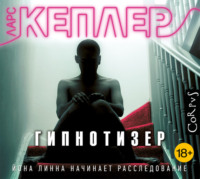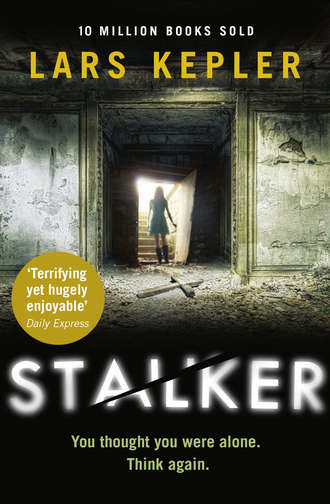
Полная версия
Stalker
‘You’ve said all along that you were sure you killed Jurek – why was it so important to find his body?’ Åhlén asks.
‘I couldn’t try to find Joona before I’d found it,’ she replies, rubbing her cheeks with her hand to wipe the tears away.
‘Joona’s dead,’ Åhlén says.
‘Yes,’ she smiles.
Joona’s jacket and wallet were found in the possession of a homeless man who hung around Strömparterren, at the end of the island housing the parliament building in Stockholm. Saga’s watched the video of the interview plenty of times. The homeless man identified himself as Constantine the First. He usually borrowed one of the fishing boats and slept outside a heating vent.
He sat in the interview room with his big beard and dirty fingers, cracked lips and a wary look in his eyes. In a rattling voice he told them about the big Finn who told him to keep his distance, before taking his jacket off and swimming out into the water. He watched him swim out towards Strömbron until he reached the fast-flowing current and disappeared.
‘You don’t believe he’s dead?’ Åhlén asks calmly.
‘Several years ago he phoned me … he wanted me to find out some information about a woman in Helsinki, in secret,’ Saga says. ‘At the time I thought the woman had something to do with the case at Birgittagården.’
‘What about her, then?’
‘She was seriously ill, she was in hospital for an operation … Her name was Laura Sandin,’ Saga says, holding Åhlén’s gaze. ‘But she was really … really Summa Linna, his wife, wasn’t she?’
‘Yes,’ he nods.
‘I tried to get hold of Laura to tell her that Joona was dead,’ Saga explains. ‘Laura had been in a cancer hospice for palliative care, but two days after Joona’s suicide she was discharged to spend her last days at home … but neither Laura nor her daughter are still at their address on Elisabetsgatan.’
‘Really?’ Åhlén says, his thin nostrils turning pale.
‘They aren’t anywhere,’ Saga says, taking a step towards him.
‘That’s good to hear.’
‘I think Joona arranged his suicide so he could go and pick up his wife and daughter and go into hiding with them.’
Nils Åhlén’s eyes are red, and his mouth is twitching slightly with emotion when he speaks:
‘Joona was the only person who believed that Jurek’s reach extended beyond the isolation unit, and as usual, he was right … If we hadn’t done this, Jurek would have killed Summa and Lumi, just as he killed Disa.’
‘Nils, I need to find Joona and tell him that Jurek Walter is dead,’ Saga says. ‘He needs to know that the body’s been found.’
She puts her hand on his arm and sees his shoulders slump when he makes his mind up.
‘I don’t know where they are,’ he eventually says. ‘But if Summa is dying, like you say … I know where you could try looking …’
‘Where?’
‘Go to the Nordic Museum,’ he says in a thick voice, as if he were worried about changing his mind. ‘There’s a small bridal crown, a Sámi bridal crown made of woven roots. Look at it carefully.’
‘Thanks.’
‘Good luck,’ Åhlén says seriously, then hesitates. ‘No one wants to hug a pathologist, but …’
Saga hugs him hard, then leaves the room and hurries along the corridor.
21
Saga parks in front of the large flight of steps leading up to the Nordic Museum, drinks a sip of cold coffee from a 7-Eleven mug, and looks at the people around her, all dressed for summer. It’s as if she hasn’t really paid attention to her surroundings before now. Adults and children, tired from the sun or long picnics, or excited and expectant on their way to the amusement park or some restaurant.
She’s barely noticed the summer passing her by again. Since Joona disappeared she has withdrawn from the world, searching for Jurek’s body.
Now it’s time to bring this to an end.
Saga gets out of the car and goes up the steps. There’s a broken syringe on one of the top steps.
She walks in through the imposing entrance, buys a ticket, picks up a plan of the museum and carries on into the entrance hall. A colourful statue of Gustav Vasa sits on a huge wooden throne gazing off towards the replica of a post-war home that’s been installed in the museum.
As she walks towards the staircase she catches a glimpse of a text about the people’s home and the Social Democratic vision of a modern, supportive and equal Sweden in which all families had the right to a home with hot water, a kitchen and bathroom.
She jogs up the stone steps and carries on to the section for Sámi handicrafts. A few visitors are walking along the glass cabinets containing jewellery, knives with reindeer-horn handles, cultural artefacts and clothes.
She stops in front of a display featuring a bridal crown. This must be the one Åhlén meant. It’s a beautiful piece of work, made of woven birch-root, with points that look like the fingers of two interlaced hands.
Saga looks at the small lock on the case, sees that it would be easy to pick, but the cabinet is alarmed and there’s a risk that a guard would arrive before she had time to look at the crown.
An elderly woman stops next to her and says something in Italian to a man pushing a stroller a short distance away.
The man speaks to the guard and is helped towards the lifts. A girl with straight fair hair is looking at the ceremonial Sámi costumes.
There’s a crackle of velcro as Saga pulls out her tiny dagger for hand-to-hand fighting from its sheath below her left armpit. She carefully slides the tip in next to the lock on the glass door, and jerks it. The door shatters and the splinters fall to the floor as an alarm goes off.
The girl looks at Saga in astonishment as she calmly puts the knife away, opens the door and removes the bridal crown.
It looks smaller outside the case, and weighs practically nothing. Saga stares at it as the alarm blares.
Åhlén told her that Summa’s mother had woven the crown for her own wedding, and that Summa had worn it for hers, and then donated it to the museum of handicrafts in Luleå.
Saga sees the guard hurrying back, and carefully turns the crown over in her hands, looks inside it and sees that someone has burned the name ‘Nattavaara 1968’ into it with a brand. She puts the crown back in the case and closes the shattered door.
She knew there was some sort of family connection to Nattavaara, and assumes that that’s where Joona is at the moment.
Saga feels her heart swell at the thought of being able to tell Joona Linna that it’s all over.
The guard’s cheeks are flushed as he stops five metres away and points at her with his radio without managing to get a word out.
22
The train pulls out of Stockholm Central Station, rocking noisily across the points as it rolls away from the dirty sidings. To the left, big white boats are gliding along on Karlbergssjön, while to the right is a concrete wall covered in badly painted-over graffiti.
Seeing as the bunks were all booked, Saga has had to take an ordinary seat. She shows her ticket to the conductor, then eats a sandwich with her eyes fixed outside the window. As the train passes Uppsala she takes off her military boots, folds her jacket around her pistol and uses that as a pillow.
The train journey to Nattavaara, over a thousand kilometres away, will take almost twelve hours.
The train rumbles on through the night. Lights pass by outside like tiny stars, fewer and fewer the further north they get. Warm air streams from the scorching-hot radiator by the panel beside her seat.
In the end the night outside the window is nothing but solid darkness.
She closes her eyes and thinks about what Nils Åhlén told her. When Joona and his partner Samuel Mendel caught Jurek Walter many years ago, Jurek announced his plan for revenge before he was isolated in the secure unit at the Löwenströmska Hospital. Samuel thought it was an empty threat, but somehow Jurek managed to reach out from his cell and snatch Samuel’s wife and two sons.
Joona realised the threat was serious. With Nils Åhlén’s help, he arranged for his wife and little daughter to die in a car accident. Summa and Lumi were given new identities and had no further contact with Joona. As long as Jurek was alive, there was a risk that his threat might be put into practice. In hindsight, Joona saved them from a terrible death by sacrificing their life together.
But Saga can reassure Joona now. She’s going to find him and reassure him. Jurek Walter is dead, his remains have been found and identified.
At the thought of that, an almost erotic shiver runs through her body. She leans back in her seat, shuts her eyes, and falls asleep.
For the first time in ages, she sleeps properly.
When she wakes up the train is standing still and chill morning air is streaming into the carriage. She sits up and sees that she is now in Boden. She has been asleep for almost ten hours, and needs to change trains for the last part of the journey to Nattavaara.
She stretches, puts her boots on, tucks her gun in its holster, picks up her jacket and gets off the train. She buys a large cup of coffee at the station, then returns to the platform. She watches a group of young men in military fatigues and green berets getting on to a train heading in the other direction.
Someone has smeared chewing tobacco on the glass of the station clock.
A black locomotive with red undercarriage approaches with a squeal of brakes. Rubbish blows across the sleepers. The train stops and wheezes slowly at the deserted platform. Saga is the only person who gets on the train to Gällivare, and she has the carriage to herself.
The journey to Nattavaara is supposed to take less than an hour. Saga drinks her coffee, goes to the toilet, washes her face, then sits in her seat and watches the landscape go past, vast stretches of forest with the occasional red cottage.
Her plan is to go to the village shop or parish hall and ask about people who have moved in recently – there can hardly be that many.
It’s almost eleven o’clock in the morning when Saga Bauer steps on to the platform. The station is little more than a shack with a sign on its roof. In the weeds in front of the shack is a bench with peeling paint and rusting armrests.
Saga starts to walk along the road through the dark green, whispering forest. There’s no sign of anyone, but occasionally she hears dogs barking.
The road surface is uneven and cracked from frost.
She carries on, over a bridge that stretches across the valley of the Pikku Venetjoki, then she hears the sound of an engine behind her. An old Volkswagen pickup is heading towards her, and she waves her arms to stop it.
A suntanned man in his seventies, wearing a grey sweater, winds down his window and nods in greeting. Beside him sits a woman the same age, in a padded green jerkin and pink-framed glasses.
‘Hello,’ Saga says. ‘Do you live in Nattavaara?’
‘We’re just passing through,’ he replies.
‘We’re from Sarvisvaara … another metropolis,’ the woman says.
‘Do you know where the grocery store is?’
‘It closed last year,’ the old man says, picking at the wheel. ‘But we’ve got a new shop now.’
‘That’s good,’ Saga smiles.
‘It’s not a shop,’ the old woman says.
‘I call it a shop,’ he mutters.
‘But that’s wrong,’ she says. ‘It’s a service point.’
‘Then I’d better stop doing my shopping there,’ he sighs.
‘Where’s the service point?’ Saga asks.
‘In the same building as the old shop,’ the woman replies with a wink. ‘Jump up on the back.’
‘She’s hardly a high-jumper,’ the man retorts.
Saga climbs up on to the wheel, grabs hold of the edge of the pickup and swings herself over, then sits down with her back to the cab.
During the drive she hears the old couple carry on arguing, to the point where the pickup almost drives into the ditch. The bumper thuds and grit flies up under the vehicle, which is surrounded by a cloud of dust.
They drive into the village and stop in front of a large, red building with a sign for ice creams outside, along with symbols showing that the shop acts as an agent for the Post Office, the National Lottery, as well as a pickup point for prescriptions and supplies from the state-owned alcohol monopoly.
Saga clambers down, thanks the pair for the lift, and goes up the steps. A little bell on the door rings as she walks in.
She finds a bag of dill-flavoured crisps, then goes over to the young man at the counter.
‘I’m looking for a friend who moved here just over a year ago,’ she says without further elaboration.
‘Here?’ he asks, then looks at her for a while before lowering his eyes.
‘A tall man … with his wife and daughter.’
‘Ah,’ he says, blushing.
‘Do they still live here?’
‘Just follow the Lompolovaara road,’ he says, pointing. ‘Up to the bend at Silmäjärvi …’
Saga leaves the shop and heads in the direction he indicated. Tractor-tyres have furrowed the ground and the verge is virtually non-existent. There’s a beer can in the grass. The wind in the trees sounds like a distant sea.
She eats some of the crisps as she walks, then puts the rest in her bag and wipes her hands on her trousers.
Saga has walked six kilometres by the time she sees a rust-red house at a point where the road bends round a broad tarn. There’s no car in sight, but there’s smoke coming out of the chimney. The garden around the house consists of tall meadow grass.
She stops and hears the insects in the ditch.
A man comes out of the house. She watches his figure move through the trees.
It’s Joona Linna.
It’s him, but he’s lost weight, and he’s leaning on a stick. He’s got a curly blond beard and strands of hair are sticking out from his black woolly hat.
Saga walks towards him. The grit crunches beneath her boots.
She sees Joona stop beside a woodshed, lean his stick against the wall, pick up an axe and split a large log, then he picks up another one and splits that, then rests for a moment before picking up the pieces and carries on chopping.
She doesn’t call out because she knows he’s already seen her, probably long before she saw him.
He’s wearing a moss-green fleece beneath an aviator’s jacket made of coarse leather. The folds have cracked and the sheepskin lining of the collar has turned yellow.
She walks over and stops five metres away from him. He stretches his back, turns round and looks at her with eyes as grey as pale fire.
‘You shouldn’t have come,’ he says quietly.
‘Jurek’s dead,’ she says breathlessly.
‘Yes,’ he replies, and goes on chopping.
He picks up a new log and places it on the chopping block.
‘I found his body,’ Saga says.
His swing goes wrong, the axe catches and he loses his grip. He stands for a while with his head lowered. Saga looks down into the large wood-basket and sees that there’s a sawn-off shotgun taped to one side of it.
23
Joona leads her through a dark entrance hall. He doesn’t say anything, but holds a door opens and ushers her into a little kitchen with copper saucepans on the walls.
An elk-hunting rifle with telescopic sights is hanging under the windowsill, and on the floor are at least thirty boxes of ammunition.
The sun is shining through the drawn curtains. On the table is a coffee pot and two cups.
‘Summa died last spring,’ he explains.
‘I’m so sorry,’ she says quietly.
He puts the wood-basket down on the floor and slowly straightens his back. There’s a faint smell of smoke in the kitchen, and she can hear the pine logs crackling behind the closed hatch of the iron stove.
‘So you found the body?’ he says, looking at her.
‘I wouldn’t have come otherwise,’ she replies seriously. ‘Call Åhlén if you want confirmation.’
‘I believe you,’ he says.
‘Call him anyway.’
He shakes his head but doesn’t say anything, then, leaning on the draining board, he makes his way to the other door, nudges it open and says something quietly into the gloom in Finnish.
‘This is my daughter, Lumi,’ Joona says as a girl comes into the kitchen.
‘Hello,’ Saga says.
Lumi has straight brown hair, a friendly, curious smile, but her eyes are as grey as ice. She’s tall and thin, dressed in a simple blue cotton shirt and a pair of faded jeans.
‘Are you hungry?’ Joona asks.
‘Yes,’ Saga replies.
‘Sit yourself down.’
She sits down on a chair and Joona gets out bread, butter and cheese, then starts chopping tomatoes, olives and peppers. Lumi heats some water and grinds coffee beans in a manually operated mill. Saga looks at the dimly lit room behind them, and sees a sofa and a stack of books on a table. Hanging from a drip-stand is a night-vision sight and a mount allowing it to be attached to a rifle for nocturnal hunting.
‘Where was he?’ Joona asks.
‘He drifted ashore on Högmarsö,’ Saga replies.
‘Who?’ Lumi asks, glancing at the control panel for some twenty motion detectors that’s attached to the wall beneath the spice-rack.
‘Jurek Walter,’ Joona says, cracking twelve eggs into the frying pan.
‘I’ve found his body,’ Saga says.
‘So he’s dead?’ she asks lightly.
‘Lumi, can you take over for a minute?’ Joona says, then leaves the kitchen.
His heavy steps echo through the hall, then the front door closes. Lumi gets some dried basil and rubs it between her palms.
‘Dad says he had to leave me and Mum,’ Lumi says, trying to keep her voice steady. ‘He says Jurek Walter would have killed us if we’d had any contact with him at all.’
‘He did the right thing, he saved your lives, there was no other way,’ Saga says.
Lumi nods and turns towards the stove. A few tears drip on to the black metal range in front of her.
Lumi wipes her face, lowers the heat, and then carefully turns the omelette with a spatula.
Through the closed curtains Saga can see Joona standing out on the road with a phone pressed to his ear. She knows he’s talking to Nils Åhlén. He’s frowning, and his jaw muscles are tense.
Lumi turns the stove off and lays the table as she looks at Saga curiously.
‘I know you’re not going out with Dad,’ the girl says after a while. ‘He’s told me about Disa.’
‘We used to work together.’ Saga smiles.
‘You don’t look like a police officer,’ the girl says.
‘Security Police,’ Saga says curtly.
‘You don’t look like one of them either,’ she laughs, sitting down opposite Saga. ‘But if you say you’re from the Security Police, then you must be Saga Bauer.’
‘Yes.’
‘Dig in,’ Lumi says. ‘It’ll get cold.’
Saga thanks her, helps herself to some omelette, bread and cheese, and pours coffee for the two of them.
‘How is Joona?’ she asks.
‘Yesterday I’d probably have said not good,’ Lumi says. ‘He’s freezing most of the time and hardly sleeps, he keeps watch over me, makes himself stay awake … I don’t know how he manages it.’
‘He’s very stubborn,’ Saga says.
‘Is he?’
They laugh.
‘You know, I didn’t have my dad for so many years,’ the girl says, and her eyes grow moist. ‘I barely remembered him. I mean, nothing can make up for that, but … we’ve spent more than a year sitting and talking … every day, for hours … I’ve told him about me and Mum, what we did and how we were … and he’s talked about himself … There can’t be many people who’ve talked so much with their dad.’
‘Not me, that’s for certain,’ Saga says.
Lumi stands up when a motion sensor reacts to Joona’s approach. She switches the alarm off and then they hear the front door open, followed by footsteps in the hall.
Joona comes into the kitchen, puts his stick down, leans against the table, then sinks on to a chair.
‘Åhlén is certain,’ he says, helping himself to some food.
‘We’re quits now,’ Saga says, looking him in the eye. ‘I don’t care what you think, but we’re quits … I killed him, and I found the body.’
‘You’ve never owed me anything.’
Joona is leaning forward slightly, with his arms wrapped round his body, taking small mouthfuls of food. Lumi puts a thick blanket round his shoulders, then sits back down.
‘Lumi’s going to study in Paris,’ Joona says, smiling at his daughter.
‘We don’t know that,’ she says quickly.
A smile flits across her pale face. Saga sees Joona’s hands shake as he picks up his cup and drinks some coffee.
‘I’m cooking venison fillet tonight,’ he says.
‘My train back leaves in two hours,’ Saga says.
‘With chanterelles and cream,’ he adds.
She smiles. ‘I have to go.’
24
Erik is early for his piano lesson, and stands on the pavement opposite the door to Lill-Jans plan 4. The curtains on the ground floor are open, and he can see straight into Jackie Federer’s flat. She’s in the kitchen, she runs her hand along the wall-mounted cupboards, takes out a glass, then holds her finger under the tap. He can see that she’s wearing a black skirt and an unbuttoned blouse. He walks across the street to see better, gets closer to the window and can now see that her wet hair has dripped down the back of her silk blouse. She drinks the water, wipes her mouth with her hand, then turns round.
Erik stretches and catches a glimpse of her stomach and navel through the opening of her unbuttoned shirt. A woman with a pushchair stops on the pavement and stares at him, and he suddenly realises how he must look. He hurries to reach the pavement and goes in through the entrance. Once again he stands in the darkness outside the door of her flat and moves his finger towards the bell.
Since the hypnosis session he has been thinking that Rocky’s alibi may well have been genuine, and has had to double his nightly dose of Stilnoct in order to get any sleep. The earliest he has been able to book a visit to Karsudden Hospital is first thing tomorrow morning.
When Jackie opens the door her blouse is buttoned. She smiles calmly at him and the light in the stairwell reflects off her dark glasses.
‘I’m a bit early,’ he says.
‘Erik,’ she smiles. ‘Welcome.’
They go inside and he sees that her daughter has pinned up a drawing of a skull under the no entry sign.
He follows Jackie along the passageway, watching her right hand trace the wall, and it strikes him that she seems to move with no obvious caution. Her shiny blouse is hanging outside her black skirt, across the small of her back.
As her hand reaches the door frame she switches the light on and heads out across the living-room floor until she comes to the rug, where she stops and turns towards him.
‘Let’s hear how far you’ve got,’ Jackie says, and gestures to the piano.
He sits down, opens the score and brushes his fringe from his forehead. He puts his right thumb on the right key and spreads his fingers.
‘Opus 25,’ he says with jokey solemnity.
He starts to play the notes that Jackie set him for homework. Even though she’s told him not to, he can’t help looking at his hands the whole time.
‘It must be awful for you to have to listen to this,’ he says. ‘I mean, if you’re used to beautiful music.’
‘I think you’ve been very good,’ she replies.
‘Can you get music scores in braille – you must be able to?’ he asks.
‘Louis Braille was a musician, so that happened fairly naturally … but in the end you have to memorise everything anyway, because of course you need both hands when you’re playing,’ she explains.
He puts his fingers on the keys and takes a deep breath, then the doorbell rings.
‘Sorry, I’ll just get that,’ Jackie says, and stands up.
Erik watches her go out into the hall and open the door. Outside stands her daughter, next to a tall woman in gym clothes.


